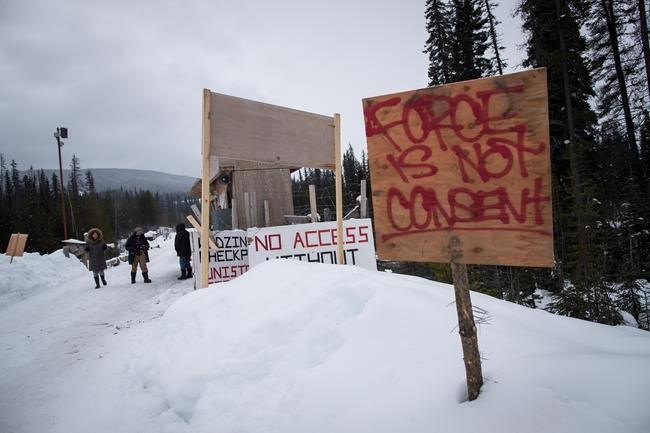Charges will not be laid against the 22 pipeline protesters who were arrested on traditional Wet’suwet’en territory in northern B.C. in February, the BC Prosecution Service has confirmed.
The protesters were arrested between Feb. 6 and 10 near Smithers, sparking solidarity protests across the country.
The prosecution service recommended to no charges due to lack of violence during the arrest and lack of evidence linking the arrested protesters to damage at a bridge as reasons for dropping charges.
They also mentioned ongoing negotiations between hereditary Wet’suwet’en chiefs and the B.C. government, to which Crown counsel is not privy.
Arrests were made based on an injunction granted to Coastal GasLink, the proponent trying to build a 670-kilometre liquefied natural gas pipeline through from Dawson Creek to Kitimat, running through traditional Wet’suwet’en territory.
Coastal GasLink has also dropped civil charges against the protesters.
Opposition to the pipeline goes back to 2007 when interest in the pipeline route began. A checkpoint at the entrance to the territory was established in 2009, and they constructed buildings on the pipeline route, including the Unist’ot’en Healing Centre which opened in 2015. The centre is used for art programs, language courses, addictions treatment and cultural camps, and some people live there year round.
In December 2018, Coastal GasLink got an injunction against the checkpoint, because workers had been denied access. Unist’ot’en refused to take down a checkpoint – and a second Wet’suwet’en house, Gidimt’en, set up an additional check point. RCMP showed up in January 2019 to enforce the injunction, arresting at least 14 people. Up to 30 solidarity protests happened around the country that month.
Things flared up again in this winter when an injunction was again granted to Coastal GasLink. RCMP established a satellite office near the camp. On Feb. 6 of this year, RCMP began raiding the camps, arresting six people. The next day they arrested four people at a second camp. On Feb. 8 they arrested 11 people, and finally on Feb. 10 they arrested seven more people. Police arrived with dogs, rifles and helicopters to a scene of elderly matriarchs singing around a fire.
Internal documents leaked detailed that the RCMP officers were instructed to “use as much violence toward the gate as you want,” up to and including lethal force. The documents show that RCMP knew Wet’suwet’en protesters had hunting rifles, but said there was “no single threat indicating that [land defenders] will use firearms.”



